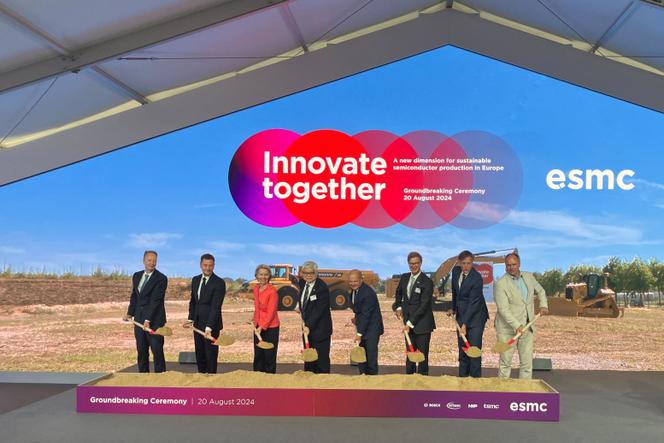


It was August 20, in Dresden, Saxony, Germany's microelectronics stronghold. Unaccustomed to demonstrations of joy, Chancellor Olaf Scholz was delighted. A prestigious delegation was on hand to lay the foundation stone for a giant new microchip factory. Alongside the newly re-elected Commission president, Ursula von der Leyen, Che-Chia Wei, head of TSMC, the world's leading semiconductor manufacturer, had come all the way from Taiwan.
The Asian giant has joined forces with Germany's Bosch and Infineon, as well as the Netherlands' NXP, in the European Semiconductor Manufacturing Company (ESMC) joint venture to build the plant. The site will supply chips to the local automotive industry from 2027, creating 2,000 jobs.
The €10 billion investment was made possible thanks to the largesse of Berlin, which granted no less than €5 billion in subsidies for the project. For Scholz, the visit to Dresden offered a rare opportunity to justify his policy in favor of this cutting-edge industry, against a gloomy political and economic backdrop.
Berlin has earmarked €20 billion in order to attract the world's leading semiconductor manufacturers to Germany. It sees itself as a big winner from the European Chips Act launched by Brussels in 2022. This program is allocating €43 billion to double Europe's weight in global chip production by 2030. It's Europe's response to the global subsidy race currently being waged by the world's major regions in microelectronics, deemed a key strategic field for the future.
And yet, across the Rhine, doubts are slowly creeping in about the reality of announced plant projects and the relevance of subsidies, against a backdrop of market downturn. In Magdeburg (Saxony-Anhalt) and Ensdorf (Saarland), two plant projects launched with great fanfare in 2022 and 2023, are currently at a standstill.
The American Intel Corporation, involved in the Magdeburg projects, is mired in crisis. At the beginning of August, its embattled boss, Pat Gelsinger, announced a worldwide cost-cutting plan including 15,000 job cuts and a 20% reduction in investment projects. While the Magdeburg plant has not yet been mentioned, mistrust has set in about the future of the €30-billion project, €10 billion of which is to be financed by Berlin, on condition that the subsidy is endorsed by Brussels.
In Ensdorf, Saarland, work on another gigafactory has also been suspended. The Wolfspeed company, which has teamed up with German automotive supplier ZF to build a site for the production of silicon carbide semiconductors – a technology heralded as revolutionary – has postponed construction until 2025, two years later than originally planned.
You have 53.86% of this article left to read. The rest is for subscribers only.
